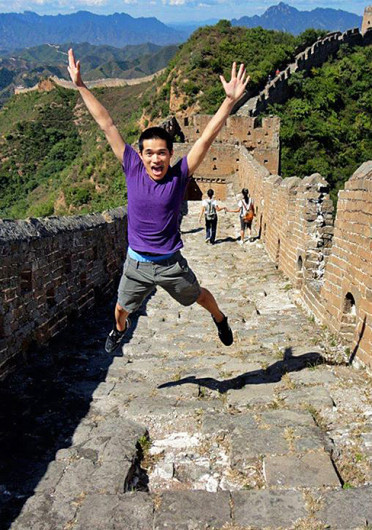
Brian Yeh, a fourth-year in economics, poses while visiting the Great Wall of China during his study abroad trip last academic year.
Letter to the editor:
Although famous for his signature bow tie and occasional practice of dropping in on student keggers, what former Ohio State president E. Gordon Gee is less known for (but for which he deserves no less recognition) is his expressed desire that all incoming OSU students possess a passport. While this was never made an admissions requirement, OSU in recent years has made substantial progress in showing it recognizes the value of the passport as the “driver’s license of the 21st century.”
From Global Gateways in China, India and Brazil, to month-long Maymester programs in places as far-flung as Uganda and Hungary, many students have been able to experience new people, languages and cultures — often for the very first time. Having had the opportunity to travel extensively as a child, in making my own decision to study abroad, I sought a culturally immersive program that would push me to my cultural and linguistic boundaries.
With this criterion in mind, I decided to venture off the proverbial “beaten path” and study at the Middlebury Schools Abroad program in Beijing for the 2012-13 academic year. Although I knew full well the bureaucratic hoops I would have to jump through to study with an externally-sponsored program, I had long heard Middlebury programs are renowned for their academic rigor and system of cultural immersion.
My year in China did not disappoint. Although as a heritage learner I was afraid I would be singled out by my teachers, I discovered a corps of friendly, talented and passionate educators dedicated to helping my fellow students and I succeed in our language studies. Moreover, the Language Pledge that kept my fellow students and I (almost) constantly speaking Chinese helped me become much more comfortable speaking the language. The Language Pledge was complemented by content courses on topics ranging from the history and culture of Beijing to the Chinese Constitution — all in Chinese. My favorite, however, was my one-on-one tutorial on Chinese foreign policy, for which I met individually with my Chinese teacher for three hours per week to discuss a text written specifically for me. Beyond academics, I thoroughly enjoyed the opportunity to live and converse with my Chinese roommate, as well as group excursions to Nanjing and Luoyang.
My year in China did more to broaden my cultural and linguistic horizons than years of classes in the U.S. did. OSU should continue its efforts to make studying abroad more accessible to students of all academic disciplines — in particular through programs such as Global May. However, more must be done to encourage students to study languages at an intensive level for longer periods of time, particularly with internationally-recognized programs such as Middlebury. Of the 11 study abroad programs in China listed on the Office of International Affairs website, for example, only one uses Chinese as the primary language of instruction. Ultimately, not all study abroad programs are created equal, and OSU students should have increased access to university-sponsored programs both linguistically and culturally immersive. A complementary action would be to streamline the process of applying to externally-sponsored study abroad programs and for receiving academic credit abroad.
Brian Yeh
Fourth-year in economics
[email protected]


